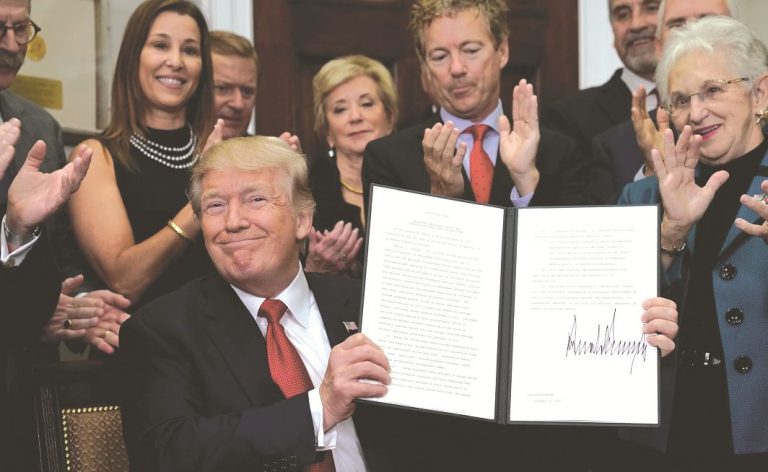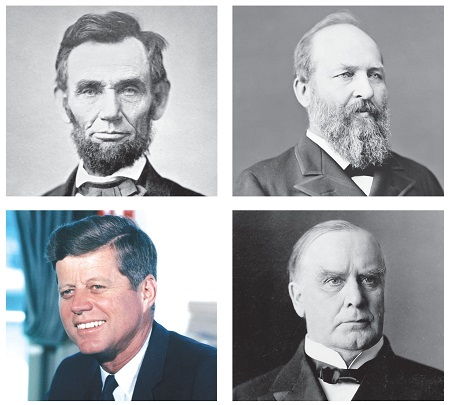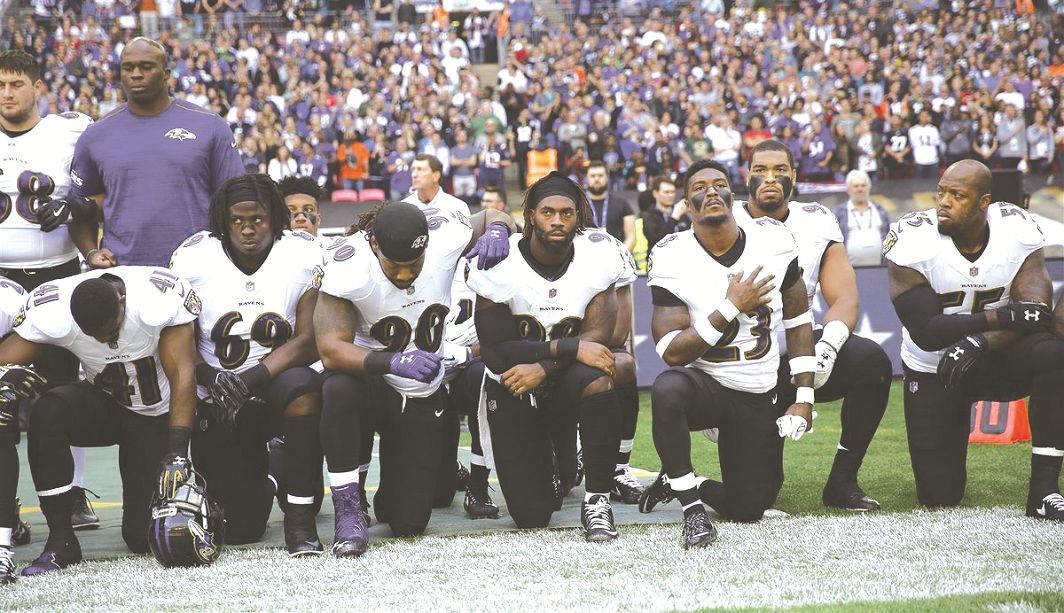
Despite the President’s erratic conduct and the conspiracies under investigation by the Special Counsel, the constitutional road to his removal is anything but a cakewalk
~By Kenneth Tiven in Washington
The best way to start a story about President Donald Trump is with a Barack Obama anecdote. We know Trump’s only ideology is to avoid or eliminate anything Obama ever said or did. Obama famously said there are no red states or blue states, only the United States. He said this before social media software—Facebook, Google, email—helped Russian trolls and bots to subdivide Americans with hate to promote the Trump campaign in 2016.
These interconnected devices have fostered a level of social division in America (and elsewhere) never before experienced, and not fully understood in the context of rapid technology change. This helped Trump win a job he apparently does not understand. Significant numbers of Americans are asking: “What can be done?”
In taking a close-up view of the impeachment clause of the US Constitution and the 25th Amendment—both describe removal of an inappropriate president—it is obvious that such an effort only succeeds when the partisans wanting removal have full legislative control. A year from now, the November 2018 elections for Congress could theoretically provide the Democratic Party the votes for impeachment or the use of the 25th Amendment. However, there is ample evidence that these foreign interventions continue around current topics such as white supremacist marches and NFL players taking a knee to protest police violence. Expanding social divisions based on class, gender, race and creed destroys Obama’s belief that there is only one United States. It also makes it harder for a single party in an official two-party system to massively shift control of the national legislature.

Considering the previous 44 presidents, the quality has ranged from extraordinary to incompetent, from morally clear to venal. It is only with the 45th —Trump—that the impeachment issue has come to public discussion within weeks of his taking office. Perhaps he said it best himself when campaigning on the basis of tearing down the office and draining what he called the “swamp of Washington government”.
The federal government started in Philadelphia, Pennsylvania, so let us revisit the summer of 1783, where the majestic building now called Independence Hall remains a national monument. The 39 delegates to the convention finished writing the Constitution, a document designed to a more perfect union to guide the colonies of North America as the United States of America. One short section that they wrote may ultimately impact the presidency of Donald Trump. It is the impeachment language.
It was the elderly sage of Philadelphia, Benjamin Franklin, a journalist, scientist and thinker of note, who pushed for what became Section Four (Impeachment) of the Second Article of the Constitution, which explains the removal of the president and federal office holders. Franklin, given to pithy statements, had lamented that assassination was an unsuitable remedy to remove obnoxious and poor leadership, suggesting it was better to have a procedural remedy written into the document.
President Trump remains the barely-in-control political candidate he was as a reality show host and investor. He appears to have no clear policy concepts.
The record suggests that while his thinking was clear, reality differs. Assassination has removed four presidents: Abraham Lincoln (the 16th President), James A Garfield (the 20th President), William McKinley (the 25th President) and John F Kennedy (the 35th President). The impeachment process has never removed a US President. Tried three times, it has never convicted a president. In 1974, Richard Nixon technically resigned when it was certain the House would approve articles of impeachment for his role in the Watergate Burglary and cover-up.
Section Four gives the prosecutorial role to the House of Representatives; the judge and jury is the Senate.
The assassination attempt on President Reagan in 1981 pushed the adoption of the 25th Amendment to clarify presidential succession and response when a president seemed unfit for office. While it sounds specific in its language, it actually has modest political utility, except when physical illness is in play. As more than one late night TV comedy monologue has noted: “You have to be mentally ill to be a politician these days.”
The Congress or the cabinet with the 25th Amendment could vote to remove a president. The very partisan and split Congress seems unlikely to agree. Republican politicians may find Trump troubling on any number of levels, but they like controlling the White House even if they can’t agree among themselves on legislation.
Alternatively, Trump’s own cabinet could declare him unfit and vote for removal, thus promoting the vice-president to the top job. Using the 25th Amendment is a daydream with as much chance of happening as cold fusion. The billionaires in the Trump cabinet got rich caring about money, not country. Four are in trouble for using private planes for transport at the taxpayer’s expense. If the Congress is helpless in dealing with Trump’s behaviour, the cabinet is spineless.
Republican politicians may find Trump troubling on any number of levels, but they like controlling the White House even if they can’t agree on legislation.
Trump’s behaviour on health, North Korea, the Iran nuclear deal, immigration, and other issues may be reprehensible and make him unfit for the office of president, but they are not high crimes and misdemeanours. Short of a landslide against Republicans in the 2018 Congressional elections, it remains doubtful that either constitutional approach is going to end Trump’s first term before it ends on January 20, 2021.
However, the 45th president could be dramatically impacted by the findings of Robert Mueller, the Special Counsel, whose team is investigating Trump campaign collusion with Russia in the US election and obstruction of justice in firing the FBI director, James Comey.
This has not cooled Trump’s preference for dominance over consensus, rage over intellectual honesty, and this contributes to a thin skin when it comes to criticism, especially from other Republicans. For two weeks, he has engaged in disparaging arguments with respected US Senator Bob Corker, who said the White House was like a daycare centre and that Trump was capable of starting World War III. Other Republicans in the Congress agree but only if their anonymity is protected. Trump challenged Secretary of State Rex Tillerson on IQ scores after he apparently muttered something about Trump being a moron.
By almost any measure, he remains the barely-in-control political candidate he was as a reality show host and real estate investor. He appears to have no clear policy concepts and continually says things which astonish many Americans, inferentially suggesting how little he actually knows: “Puerto Rico is an island surrounded by water, big water, ocean water.” He may be president of the US, but he sees “his” nation as the roughly 26 percent of the adult population that not only voted for him, but adores the “up yours” low-brow attitude he exhibits towards people he doesn’t consider his base. (In the US, only half the eligible voters actually cast ballots for a variety of personal reasons or political impediments.)

Trump thinks about Trump. His disregard for the cost or optics of flying to a property he owns to play golf every weekend reflects his disregard for presidential appearance.
Trump’s golfing bracketed the Hurricane Maria disaster in Puerto Rico. He may have thought the effort to send relief material to the island was working, without understanding the distribution issues. So when the mayor of San Juan, Carmen Yulín Cruz, criticised the relief efforts, Trump lost it. He spent two days engaging in a personal feud with her.
Until this, Trump’s “grudge presidency” had not been tested by a humanitarian crisis in which lives were being lost in real time. His self-described glowing performance assessment compared badly with the actual visual stories being reported live from the island. Implying by tweet that Puerto Ricans are lazy and disorganised because they are Hispanic, and mainly people of colour, was not well-received except by his most fervent supporters. He has had little or nothing to say about wildfires consuming large areas of Northern California, killing nearly 40 people. California is a blue state turning ash gray.
Additionally, on the matter of his emotional stability there is this: The repeal of Obamacare, the health plan, failed again when the GOP could not muster the necessary 50 votes. An obviously frustrated Trump is ignoring Congress and using executive orders to change as many aspects of the medical insurance system as he can unless federal courts order him to stop.
For the former TV show host, the betting is that this daily drama of “Being President” will run four years and provide more global chills and plot devices than Game of Thrones.
—The writer has worked in senior positions
at The Washington Post, NBC, ABC and CNN
and also consults for several Indian channels

